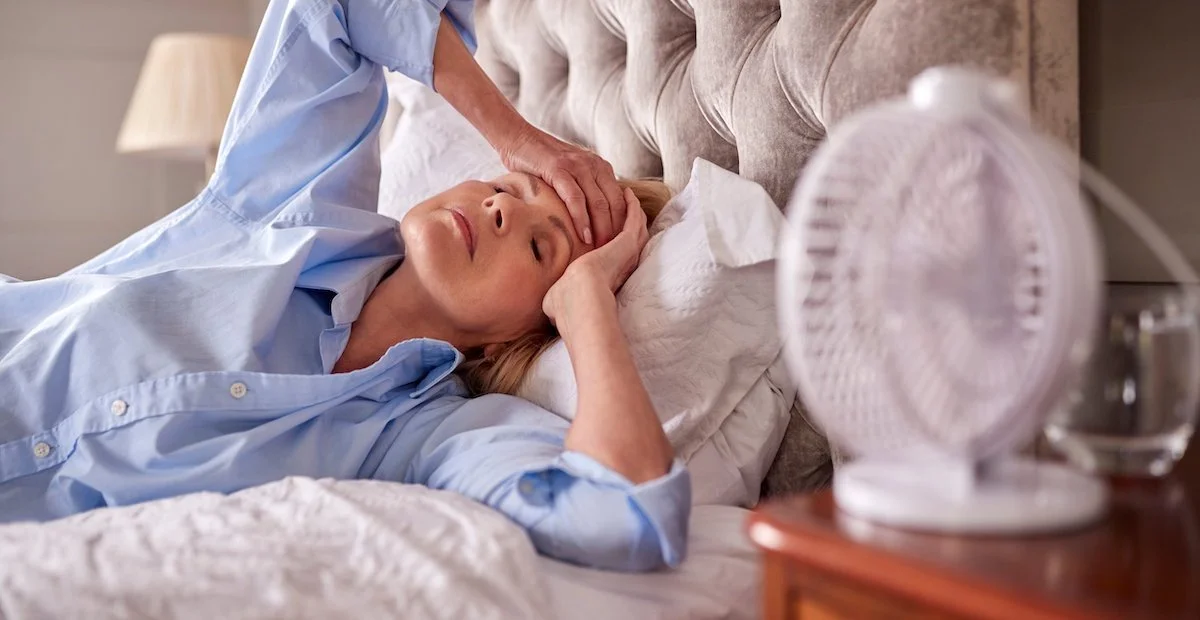Why Perimenopause Can Cause Sleep Issues
By: Kelly Murray, Certified Adult Sleep Coach, FDN-P
I want to address a specific group of women in their 40s who are facing challenges when it comes to getting the restful sleep they deserve. This struggle personally resonates with me, as I began experiencing sleep difficulties during this pivotal phase of life.
Night after night, I diligently practiced meditation and limited my screen time before bed, yet I found myself consistently waking up at 3:00 a.m., enduring a sleepless stretch that would sometimes last for hours. On particularly tough nights, sleep eluded me entirely. I felt incredibly frustrated because I was implementing all the right strategies, but sleep remained elusive.
That’s when I discovered that my sleep struggles had less to do with my behaviors and more to do with a transformative process I was undergoing — Perimenopause.
If you're a woman in your 40s who is diligently following sleep guidelines but still finds yourself grappling with sleeplessness, this blog post is tailor-made for you. I will delve into what Perimenopause entails, explore how it affects your sleep, and share effective strategies to combat these challenges.
What is Perimenopause?
In case you're unfamiliar with the term, Perimenopause refers to the transitional period leading up to Menopause. Menopause, as you may already know, marks the cessation of menstruation and requires a full year without a period to be officially declared. During Perimenopause, your menstrual cycle becomes irregular as your body gradually produces lower levels of estrogen and progesterone—the hormones that regulate our reproductive cycle.
The time frame for Perimenopause varies from woman to woman:
Some experience the change in a matter of months, while for others, it may extend up to 10 to 15 years.
On average, this phase lasts approximately four years, typically occurring in your mid to late 40’s, with Menopause itself typically commencing in your early 50’s.
For certain women, Perimenopause can begin as early as their late 30s, extending the duration to around a decade.
You may be wondering, "How will I know when I'm experiencing Perimenopause?" Let me outline some of the common symptoms. Firstly, irregular periods are a hallmark sign. Your cycle may become shortened, with more frequent or even skipped periods. Additionally, your flow may vary, becoming either heavier or lighter. Ultimately, the specific manifestations depend on your unique physiology, but it's likely that you'll encounter a combination of these changes.
In addition, when you're going through Perimenopause, you may experience vaginal dryness, hot flashes, mood swings, and an array of other experiences. And of course, one of the symptoms that we're going to explore today is --insomnia–which is prevalent during Perimenopause. The Women's Health Initiative, an extensive 15-year study involving 50,000 women, discovered that 39-47% of participants encountered sleep issues during this transitional period.
Factors That Contribute to Sleep Issues in Perimenopause
Two primary factors that contribute to the heightened prevalence of sleep problems during this transformative time are known as :
Estrogen Dominance
Insulin Resistance
Estrogen Dominance
Estrogen, a highly influential hormone, stimulates follicle and endometrial growth, aids in bone development, and plays a role in cardiovascular health and thermal regulation. In contrast, progesterone, the calming counterpart, assumes control by preparing the endometrial lining and ensuring relaxation of the uterus during pregnancy. Progesterone also signals the brain to halt the reproductive cycle, indicating that pregnancy has occurred.
However, as we navigate Perimenopause, progesterone—the soothing hormone—commences its decline. Consequently, our estrogen and progesterone levels become imbalanced, tipping the scales towards estrogen dominance. This hormonal imbalance induces feelings of anxiety, as progesterone's calming influence diminishes. As you may already know, anxiety can significantly impact your ability to sleep.
The best thing you can do to counteract estrogen dominance is to take really good care of your liver. Love on that liver. That's because our liver helps our body to metabolize estrogen so that it can be cleared from our system. If your body isn’t clearing estrogen, then there's going to be a backup. That is just going to exacerbate estrogen dominance. For detailed guidance on liver care, I suggest you read this previous blog post, linked here. Meanwhile, here are a couple of tips:
Reduce your toxic load.
One of the big drivers of toxicity in our system is consuming alcohol. Although it may sound discouraging, minimizing alcohol intake proves crucial as you age. If completely abstaining is challenging, consider reserving it for special occasions or restricting yourself to one or two drinks only on Friday or Saturday nights. Daily consumption of alcohol can wreak havoc on your liver, hormones, and ultimately, your sleep.
Eat your cruciferous vegetables.
This group includes broccoli, cauliflower, and Brussels sprouts, among others. Cruciferous vegetables contain an enzyme called DIM, which aids in estrogen breakdown. Aim for one to three servings of these vegetables daily.
Insulin Resistance
The other reason your sleep may start to struggle during this magical time called Perimenopause is that your cells become more insulin resistant. If you've never heard of this concept before, our bodies produce a hormone called insulin. Insulin's responsibility is to transport sugar from our blood into our cells. Anytime you eat starchy foods, sugary foods, insulin knocks on our cells doors and asks them to absorb sugar. What happens when you become insulin resistant is that your cells basically won't answer the door and therefore the sugar just builds up in your blood.
The reason this is a problem is when you consume starchy or sugary foods since insulin fails to effectively regulate your blood sugar levels. Consequently, your blood sugar spikes and subsequently plummets, triggering the stress response. In response to stress, our bodies produce cortisol, which prompts the liver to release sugar for an energy boost. This rollercoaster of blood sugar levels can occur not only during the day but also disrupt your sleep at night.
For a more comprehensive understanding of the blood sugar rollercoaster and techniques to stabilize your blood sugar levels, I encourage you to explore a previous video I posted. However, here's a brief summary of strategies to balance your blood sugar:
Reduce or eliminate sugar and moderate your intake of starches
Including vegetables like carrots and peas, as well as grains. By lowering your blood sugar levels, you can minimize insulin's constant signaling to your cells, fostering increased responsiveness to insulin over time.
Take a 10-minute walk after meals.
This short, gentle walk helps your body to utilize the sugar in your blood and help to flatten out that big blood sugar spike.
Let’s Get You Sleeping Again
These strategies merely scratch the surface of the techniques you can employ to counteract the adverse effects of Perimenopause, particularly regarding your sleep.
If you find yourself in the midst of Perimenopause and you’re enduring sleepless nights, I highly recommend reaching out to me for personalized assistance. Together, we can navigate this phase and explore functional testing, allowing us to assess your hormone balance, liver health, and gut health.
If you're interested in working one-on-one with me, please schedule a free 30-minute discovery call with me to learn more about how I can support you. →
Sweet Dreams
Kelly Murray is a certified adult sleep coach and an award-winning pediatric sleep consultant based in Chicago offering sleep coaching services nationwide.





